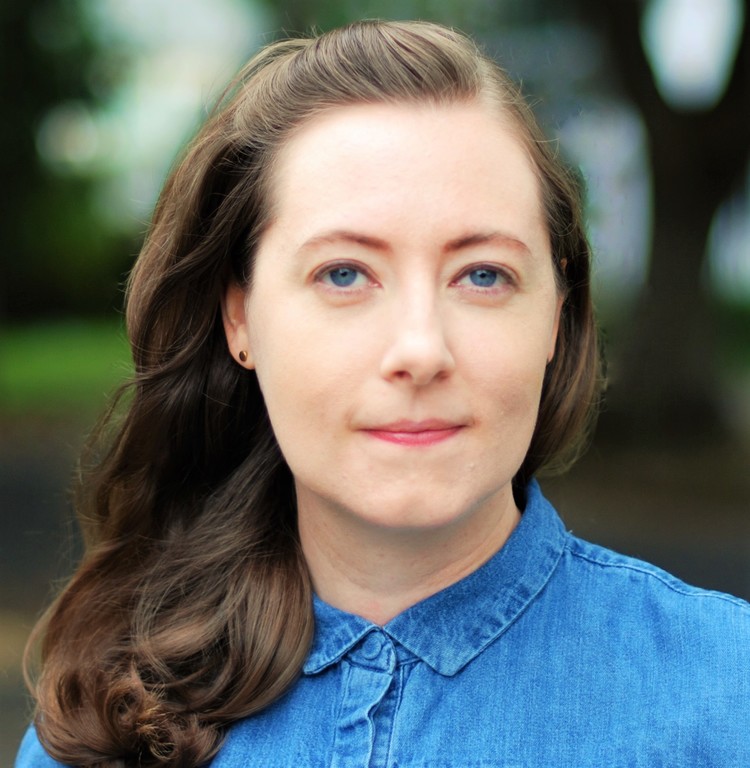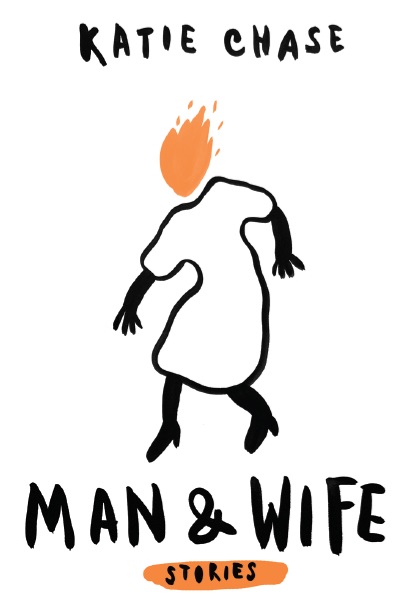Interview: Katie Chase
 Midwestern Gothic staffer Kristina Perkins talked with author Katie Chase about her collection Man and Wife, the puzzle-like short story, exaggerated realities and more.
Midwestern Gothic staffer Kristina Perkins talked with author Katie Chase about her collection Man and Wife, the puzzle-like short story, exaggerated realities and more.
**
Kristina Perkins: What is your connection to the Midwest?
Katie Chase: It’s home. I grew up in a suburb of Detroit, and after graduating from the University of Michigan, lived in Chicago for a few years. Then I was in Iowa City, for my MFA and a while after. It wasn’t until the year that I turned thirty that I left for the West coast, which wasn’t exactly specifically selected, though I was interested in having the experience of living elsewhere. My parents are still in my childhood home, and I visit at least once a year and sometimes entertain coming back.
KP: You’ve lived in Portland, Oregon for the past six years. What is it like being a Midwesterner in Oregon? How has your understanding of the Midwest shifted overtime?
KC: I find myself drawn to a lot of other Midwesterners! There are plenty of us out here. Over time my sense of the Midwest as a region has become both more nuanced and more distinct. At the same time that I’m quick to go on the defensive against the common heartland/flyover-state stereotypes when I encounter them, I have become more cognizant of certain underlying shared traits that give me a great deal of comfort to come into contact with. Generally, where I live now feels much softer to me, in a way that the Midwest I knew never seemed and that I am skeptical of and resistant to.
KP: How has your relationship with the Midwest — and, specifically, Detroit — influenced your writing? In what ways do the stories in your debut book, Man and Wife, reflect this relationship?
KC: A lot of what I try to capture in Man and Wife has to do with that childhood experience of opening your eyes to the wider world, that disorientation of realizing that what you have taken for granted as normal is not necessarily so, nor is it all that meets the eye; there is a darker side, and there are other ways. The forces that shaped Detroit and its suburbs tell a complicated story about our country; as a city it’s tremendously unique, and might seem to some strange, yet it’s also in some sense America writ large. I’m absolutely interested in trying to get at that larger story in my work.

KP: What about short story writing do you find most compelling? What does the space of the short story offer that other forms of writing do not? What challenges accompany that space?
KC: Not that I’m into actual puzzles, but what I love about short stories is that they are puzzlelike: I love that moment when the full picture begins to coalesce, I can start to see it whole, and the process becomes one of fitting in all the right-looking pieces within a confined space. With short stories, I can do all the things I love in writing: pursue an idea, develop a voice and an approach, create a mood and a world, and I can then move on; I don’t have to live there. The kind of premises I’ve been drawn to tend to do better in the short story form; in the longer, their impact might become more diluted, and with more space comes more pressure for explanation and backstory, which I’m not necessarily interested in providing. And I’m more interested in targeting those moments that life shifts for a character than in chronicling the fallout. In a short story, everything has to happen faster and more succinctly, which does mean that those twenty or so pages can take much longer to write than some other kind of twenty pages, and that I’m often in between stories, waiting for the next one to be ready.
KP: Your title story, “Man and Wife,” won a Pushcart Prize and was chosen for the Best American Short Stories anthology in 2008. How did this recognition affect your approach in putting together your first full collection — if at all?
KC: That recognition opened some doors and made it seem more possible to even pursue getting a collection published. It actually led first to an earlier collection that was more on the nose in terms of a unifying theme and was not published. Probably, it created some urgency to put one together before my material was really ready. This collection is more cohesive in voice, tone, and approach, but looser in its conceptions. That story is still the heart of the collection and what made the others in it creatively possible, but, ten years later and working with an independent press, I wasn’t really thinking about the commercial aspects and expectations that such recognition can be tied to.
KP: In Man and Wife, you write within a series of distorted, yet eerily familiar, alternative realities. In a recent interview with Oregon Public Broadcasting you discussed your approach to this surrealism, explaining that you purposefully “exaggerate a phenomenon [you] see as already existing” and “make it bigger, louder, and more literal.” Within these exaggerated realities, how do you navigate the relationship between the literal and the symbolic? How does humor inform this relationship?
KC: I try to treat these realities as matter-of-factly as I can, ground them in as much detail as seems necessary, so that they don’t feel merely symbolic or allegorical — though they always will to some extent. Much of my humor, in life and on the page, is conducted with a straight face (sometimes I know no better than someone else when I am being completely sincere and when ironic). I think humor is inherent in exaggeration, though so is horror, and once a premise is in place those effects will happen naturally in attending to the sentence level. To get specific with an example, in “Creation Story,” a struggling, Detroit-like city is being demolished — not just its abandoned buildings, not just to “right-size” it to something denser, but in entirety. I think the conversation of how (or whether) “to save the city” has turned, but anyone who’s followed it will know there was a time when that “solution,” to completely level it and start over, would be casually proposed as a half joke. And taken with the history of clearing “slums” for “revitalization,” taken with the idea that Detroit or any city could ever or should ever be treated by young artists or anyone as a blank slate, without a complex history, that joke, like any joke, is revealed as dealing in some uncomfortable actualities. (*steps off soapbox*)
KP: Who is your favorite contemporary author, and how have they influenced your style?
KC: If I have to pick a single favorite, it would be Alice Munro, but I wouldn’t say she has influenced my style. She has influenced my subject, as she is so unabashedly concerned with the female experience, and a certain type of female at that. I admire that, and her dedication to the short story, and how she seemingly ceaselessly mines to great success the same territory, both in terms of setting and in situation and character. For style, I would point more to people like Kevin Brockmeier, Judy Budnitz, and George Saunders, who work more imaginatively at the intersections of genre.
KP: What’s one thing you wish you had known when you first began writing?
KC: All the things I heard have turned out to be true, that it’s a difficult path requiring grit and discipline and patience and luck as much as talent and passion and won’t make you much, if any, money. I do wish I had taken more seriously the necessity of establishing a concurrent career/more enjoyable, reliable way to make rent, but there’s still time for that and I don’t really regret the focus and experiences that ignoring that necessity has allowed me.
KP: What’s next for you?
KC: I will keep writing! I have hopes that the universe would allow me a second collection of stories and also that I might find myself writing something that turns out to require the longer form. Mostly, because I want to give myself new challenges and not simply repeat what has worked well enough in the past, I’m allowing myself to play around — have flings, rather than too quickly declare a commitment to a specific project.
**
Katie Chase is the author of the story collection Man and Wife (A Strange Object). Her fiction has appeared in such publications as the Missouri Review, Narrative, ZYZZYVA, Prairie Schooner, Mississippi Review, and the Best American Short Stories and Pushcart Prize anthologies. A graduate of the Iowa Writers’ Workshop, she was the recipient of a Teaching-Writing Fellowship, a Provost’s Postgraduate Writing Fellowship, and a Michener-Copernicus Award. She has also been a fellow of the MacDowell Colony and the Center for Steinbeck Studies at San José State University. Born and raised outside Detroit, Michigan, she lives currently in Portland, Oregon.






